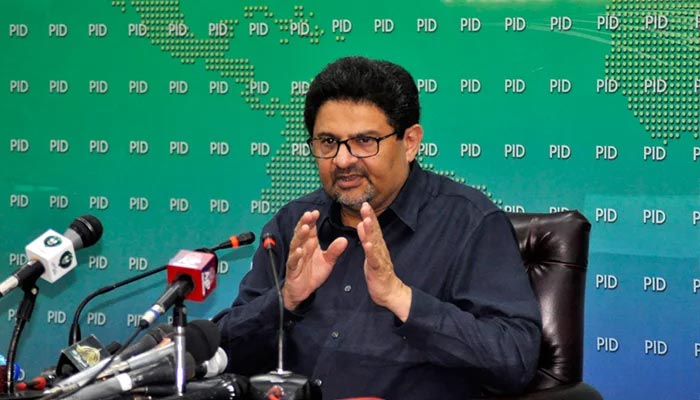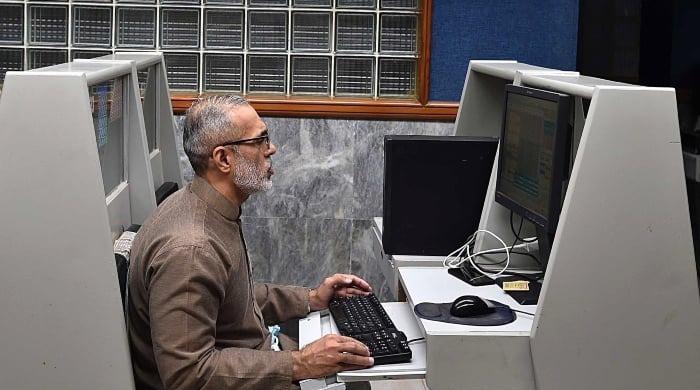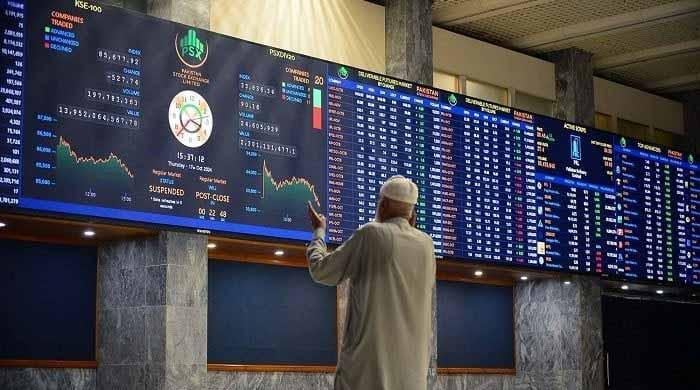IMF programme to bring economic stability: Miftah Ismail
Finance minister forms three committees to review and resolve issues of capital markets
August 09, 2022

- Finance minister forms three committees to review and resolves issues of capital markets.
- "Pakistan can even have a balance of payments surplus in coming months," he adds.
- PSX management emphasises inequity in taxation is discouraging corporatisation and documentation.
KARACHI: Federal Minister for Finance and Revenue Miftah Ismail Tuesday said that macro-economic stability will come along with the International Monetary Fund (IMF) programme resuming, which is expected to be finalised by the end of August as all conditionalities have been met.
During a meeting with the leadership of the Pakistan Stock Exchange (PSX), the finance minister said that the balance of payments position is now well under control. With increased hydel power, lower energy demand and lower oil prices, “Pakistan can even have a balance of payments surplus in coming months”.
Miftah, while commenting on the tax measures, said that fiscal discipline will be strictly followed and all additional expenditures will be fully funded by tax measures.
“Ten per cent super tax has been imposed for one year only while alternative revenue streams are developed,” he said, adding the "alternate dispute resolution (ADR) linked tax on banks will not be imposed retrospectively and tax revenues from the retail sector are expected to be significantly more as compared to last year."
According to a statement issued by the stock market, the participants of the meeting held a discussion on the proposals presented by PSX to the finance minister for the sustainable development of the capital markets.
The participants told that among immediate steps that can be taken, increasing dividends by the profitable state-owned enterprises (SOEs) was one of them.
Presently, while some of the SOEs are extremely profitable, their payout ratio is a meagre 18%. The participants urged that this should be raised to 50%. The finance minister agreed and directed that a meeting be held immediately with the relevant ministry and all relevant stakeholders to consider this matter.
Urgent actions to be taken
During the meeting, with respect to the capital markets, it was discussed that urgent actions be taken to mitigate the impact of macro developments for sustained and secular growth of the capital markets.
“As perhaps the largest stakeholder in the market, the government will benefit directly by developing better funding alternatives, improved documentation and higher tax revenue, as well as avail the broader benefits that accrue to an economy on account of having developed capital markets,” the PSX management highlighted.
It was emphasised that the two biggest obstacles to capital markets growth are:
- Tax incentives given to other asset classes;
- Know your customer (KYC) requirements in the stock market, which are not consistently applied to other asset classes
“These obstacles are resulting in an Anti-Money Laundering (AML) and tax-driven distortion amongst asset classes which is detrimental to the efficient allocation of scarce resources in Pakistan; hence creating challenges on both demand and supply sides for the capital markets,” it was learnt.
In terms of taxation, the participants of the meeting pointed out that even though the stock market is undoubtedly one of the most documented sectors of the economy, however, the income of listed companies is subject to double tax, at the company level and later on dividends distribution level as well, whereas unincorporated businesses are subject to substantially lower taxes.
It was emphasised that this inequity in taxation is discouraging corporatisation and documentation.
Miftah forms three committees
Miftah was highly receptive to all the points discussed. In particular, he asked the Federal Board of Revenue (FBR) to immediately review any discrepancies in the capital gains tax (CGT) regime and the issue of tax credit for newly listed companies.
He asked the Securities and Exchange Commission of Pakistan to review the investment limit and AML requirements for Sahulat Accounts.
Miftah also directed the Ministry of Finance to review the listing of development financial institutions (DFIs), the procedure for issuance of debt/Sukuks in the capital markets and the interest rate setting of National Service Scheme (NSS) instruments.
In order to review all the above-mentioned matters, the finance minister set up three committees.
- First committee was set up to share the perspective of the private sector with the State Bank of Pakistan (SBP) and the Monetary Policy Committee on interest rates
- Second one was set up to coordinate with Pakistan Business Council (PBC) and PSX on all the tax issues
- Third committee was set up to coordinate the review of listing of DFIs, debt, and Sukuk issuance, reform of NSS and explore development of a market for exchange rate forward dealing which all market participants can access
It should be noted that:
- In the first committee, the SBP Deputy Governor Dr Inayat Hussain will coordinate with representatives of PSX and PBC
- In the second committee, Member Tax Policy Afaque Qureshi will coordinate with PBC and PSX on all tax issues
- In the third committee, Special Secretary Finance Awais Manzoor will coordinate along with Nasim Beg from the private sector
Miftah further committed to review progress and meet with the stakeholders again within two weeks.









